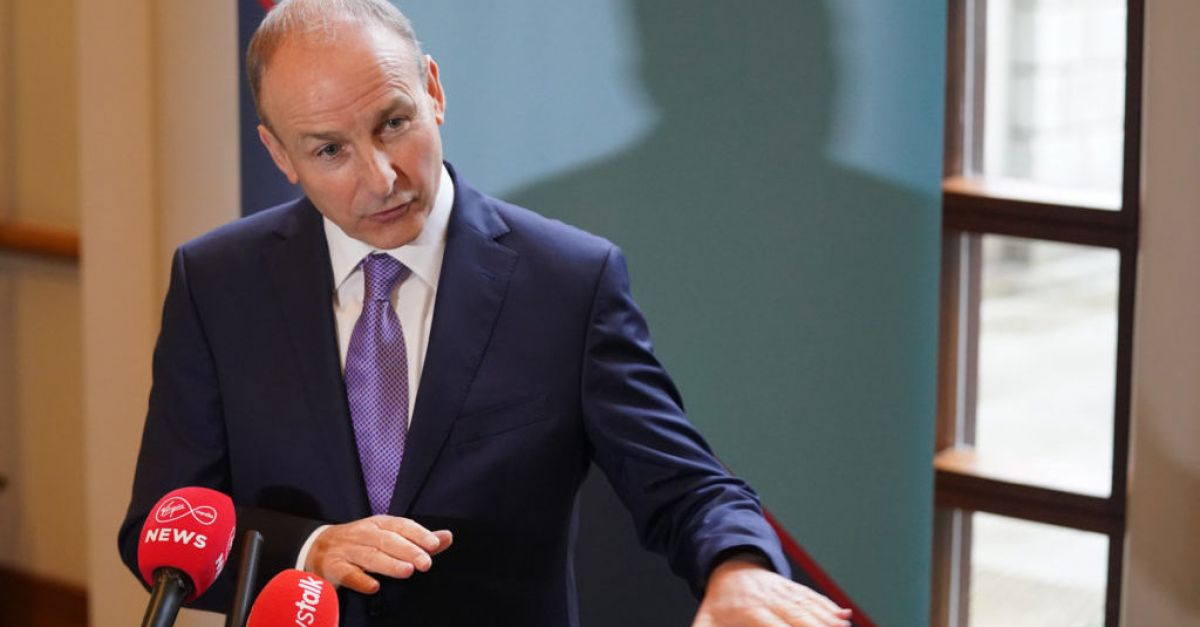
The Taoiseach has warned that the country could face further cost-of-living “challenges” later in the year if the war in Ukraine continues.
Micheál Martin said the Government will have to work strategically in what he described as a “unique set of circumstances” brought on by the pandemic and the war.
He also said exploratory talks have begun with the public sector trade union, who have called for a pay hike for public servants.
“In my view we have to work strategically as a country in the face of a unique set of circumstances brought about by Covid-19 in first instance, as the first wave of the inflationary cycle was due to that and the imbalance between demand and supply, and the war on Ukraine,” Mr Martin said.
“We must do so in a way that protects jobs, that protects the economy into the future.
Advertisement
“We are performing very well economically so far, there will be challenges I suspect towards the end of the year, if the war continues.”
Mr Martin made the comments in Belfast, where he met with Northern party leaders.
Ireland’s largest public sector trade union, Fórsa, held its national conference in Killarney, where delegates passed a number of motions calling for pay increases on Thursday.
Mr Martin said that Minister for Public Expenditure Michael McGrath has initiated talks with the union about the public sector pay agreement and it clauses.
“We have begun exploratory dialogue with the unions in terms of what would be the best approach, not just in terms of pay but in terms of services, and we will see where that takes us,” Mr Martin added.
Asked whether the Government will introduce further measures to help ease the cost-of-living burden on householders, Mr Martin added: “We have already brought in fares reductions on public transport, both for young people arising out of the budget decision and more latterly in the second package we did in terms of reducing fares.
“The agenda now is to work towards a budget framework, at the time of the budget in respect of any further measures.”
Advertisement
Mr McGrath earlier said that any agreement to increase public sector pay needs to be fair to public servants and to taxpayers, saying it will be “difficult to strike a balance”.
He said the Government needs to be careful to avoid “wages chasing inflation”, warning it will make the current economic climate worse.
While the head of Forsa, Kevin Callinan, refused to reveal the pay increase the body will be seeking from Government, many of its members have called for hikes of around nine per cent to 10 per cent.
Mr McGrath said there will be “meaningful discussions” over the coming weeks about the public sector pay agreement.
“We do have a current public service pay agreement, which runs to the end of this year and the trade union side have triggered the review of that agreement,” the Fianna Fáil minister added.
“I have acknowledged that the current level of inflation is having a real impact on private sector workers, public sector workers and people who are not in employment.
“It is having an impact on people’s living standards.
“We’re all seeing that in terms of the day-to-day costs that are being incurred.
“The union side have triggered a review of the current agreement.
Advertisement
“There have been some very initial discussions at an exploratory stage and those discussions now will move on next week, whereby my officials will be sitting down with me to discuss the possibility of new pay arrangements into the future.
“From my perspective it is important that whatever arrangements are agreed are fair to both public servants, who’ve worked really hard over the last number of years, but also to taxpayers generally, because I do have that dual responsibility.
“We are the employers as a Government of about 365,000 public sector workers, but we also have an obligation to ensure that we manage the public finances in an affordable and sustainable way into the future, so we need to strike that balance.
“It is going to be a difficult one to strike given the current environment.
“We just need to be careful not to have a situation where we have wages chasing inflation, and we end up driving higher and making the situation worse.”
He said he would not get into “specific figures” ahead of the negotiations due to take place next week.
Mr McGrath warned that increasing pay cannot solve the inflationary pressures.
“As a Government we have other levers at our disposal.
Advertisement
“We’ve used some of those to date with the measures we’ve introduced,” he added.
“There will be a further budget in October, I expect further changes to our income tax code, for example, to social welfare, and other initiatives by Government to reduce the cost of living.
“It doesn’t solely fall on the pay bill to address the inflationary pressures.
“But undoubtedly it can and will play a role if we can reach an agreement over the period ahead.
Video news
Video: Pelosi sends warning over protocol, HSE est…
“Our economy is doing well, but we need to manage this period very carefully.
“So in the lead up to the budget, we will be examining all of the options we have programmed for Government commitments in relation to further income tax reductions, in particular, that entry point to the higher rate of income tax, and there will be social welfare improvements in the budget, a focus by Government on reducing the cost of living and the day-to-day costs that people are facing.
“I accept that this is a really difficult period for people.
“It is unparalleled in recent history and I think as a Government we also just need to be straight with people and honest that there isn’t anything the Government can do to can fully offset the impact of the war on Ukraine in terms of the cost that people are facing.”











